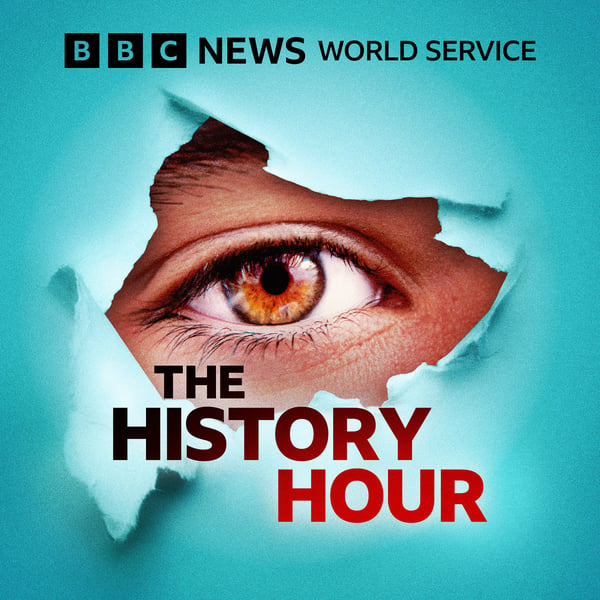Tsunamis and Caster Semenya
The History Hour
BBC
4.4 • 879 Ratings
🗓️ 23 December 2023
⏱️ 52 minutes
🧾️ Download transcript
Summary
Max Pearson presents a collection of this week’s Witness History episodes from the BBC World Service.
This week, we hear from Lumepa Hald who survived the devastating tsunami that hit Samoa in 2009 but suffered a tragic loss.
Our expert guest, Prof Tiziana Rossetto, looks back at some of the worst tsunamis in history and how they have shaped our landscapes.
Plus we talk to Caster Semenya, the gold medallist who faced questions over her gender at the 2009 World Championships in Berlin.
There’s also an interview with Peter Greste, one of three Al Jazeera journalists sentenced to seven years in jail in Egypt.
We also look at the mystery surrounding the death of Chilean poet Pablo Neruda with his driver, Manuel Araya.
And finally we talk to singer Dafydd Iwan, the “bad boy of Welsh politics”, who was arrested for defacing an English sign. He wanted official recognition for the Welsh language.
Contributors: Lumepa Hald – survivor of the tsunami that hit Samoa in 2009. Tiziana Rossetto - Professor of Earthquake Engineering at University College London, UK. Caster Semenya – world champion runner who faced questions over her gender. Peter Greste – journalist sentenced to seven years in prison in Egypt. Manuel Araya – driver of Chilean poet Pablo Neruda. Dafydd Iwan – singer who campaigned for official recognition the Welsh language.
(Photo: Devastation at a beach in Samoa after the 2009 tsunami. Credit: Getty Images)
Transcript
Click on a timestamp to play from that location
| 0:00.0 | Unmissible stories from around the globe from the BBC World Service. |
| 0:05.0 | My happy place, this is who I am. |
| 0:08.0 | Search for the documentary, lives less ordinary, and amazing sports stories stories wherever you get your BBC |
| 0:15.0 | podcasts. |
| 0:17.6 | Hello and welcome to the History Hour podcast from the BBC World Service |
| 0:27.2 | with me Max Pearson the past brought to life by those who were there. |
| 0:30.9 | Coming up, Kasta Semenya, the runner who faced questions over her gender. |
| 0:35.8 | If you think by making me go through this, will disturb me, will make me feel like I don't belong, will make me feel like I'm not women enough, if you're wrong. |
| 0:47.0 | Plus the mystery over the poet Pablo Nauruda's death in Chile, |
| 0:52.0 | journalists imprisoned in Egypt in the post-Arab Spring turmoil, |
| 0:56.4 | and with a song in his heart, the bad boy of Welsh politics. |
| 1:00.1 | We are going to deface all English road signs in Wales with green paint and if that leads to |
| 1:06.5 | prison then so be it. |
| 1:10.4 | That's all coming up later in the podcast but we begin with the cruel power of nature. |
| 1:15.8 | Each Christmas holiday period, the countries surrounding the Indian Ocean, |
| 1:19.5 | remember the appalling events of 2004, when a tsunami killed more than 200,000 people in countries |
| 1:26.5 | as far apart as Indonesia and Thailand to the east and India, Sri Lanka and even South Africa |
| 1:32.2 | to the West. |
| 1:33.4 | It was the result of one of the most powerful earthquakes recorded by modern seismology. |
| 1:39.1 | But earthquakes and tsunamis happen on smaller scales quite frequently, but they don't always make headlines around the world. |
| 1:46.0 | We're going to hear now from someone caught up very directly in a more recent tsunami which killed 149 people and left a trail of destruction in Samoa and |
| 1:55.8 | she's been speaking to Jill Kursley. |
... |
Please login to see the full transcript.
Disclaimer: The podcast and artwork embedded on this page are from BBC, and are the property of its owner and not affiliated with or endorsed by Tapesearch.
Generated transcripts are the property of BBC and are distributed freely under the Fair Use doctrine. Transcripts generated by Tapesearch are not guaranteed to be accurate.
Copyright © Tapesearch 2025.

